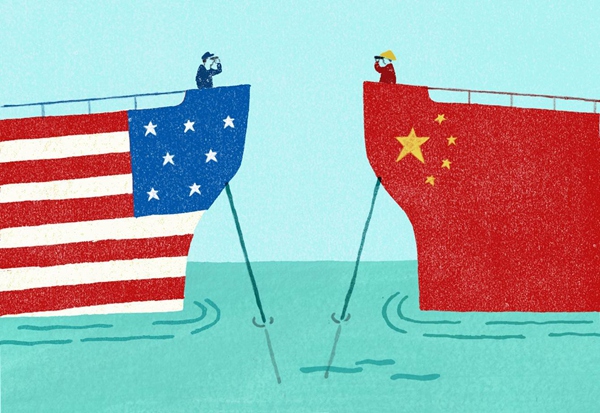


With regional agreements and de-globalization on the rise, and new economic rules expected to be worked out, China, together with the U.S., should share its wisdom on global economic governance, according to experts at a seminar.
China should and does have the ability to help craft international economic guidelines together with the U.S., as the two countries are representative of different developmental phases, according to Long Yongtu, China's former chief negotiator for entry into the World Trade Organization. Long made his remarks at a seminar held by Beijing-based Center for China and Globalization and Washington, D.C.-based Center for Strategic and International Studies (CSIS). The seminar was held on Oct.18.
As some issues that have emerged in recent decades possess no clear precedents or rules – for example, international trade, climate change and e-commerce – it is constructive for both the U.S. and China to bring forward new ideas on the global economy, according to Long.
“China has benefited a lot from entering WTO, and has no intention of changing it,” said Long. “The rest of the world should rest easy about this.”
At the seminar, Long reiterated that the Belt and Road Initiative and the Asian Infrastructure Investment Bank (AIIB), both initiated by China, are complementary to the existing global financial system rather than a challenge to it. Long pointed out that current international financial institutions including the World Bank and the Asian Development Bank cannot meet the demands of infrastructure. Therefore, China established the AIIB to open doors to every country in the world.
Echoing Long’s sentiments, Scott Kennedy, deputy director of the Freeman Chair in China Studies at CSIS, also agreed that China has no aims to start from scratch, but rather prioritizes the concept of harmonious inclusiveness.
Delivering his keynote speech at the seminar, He Yafei, former vice minister of China’s Ministry of Foreign Affairs, agreed that the U.S.-dominated Trans-Pacific Partnership Agreement (TPP) is a positive approach for setting new international trade rules, but said that the U.S. wants to “set up their own circle and avoid having China influence their rules.”
This year marks the 15th anniversary of China’s accession to the WTO. In recent years, China has been blamed for dumping and imposing subsidies on exported goods. According to statistics from WTO, by October 2015, China had been involved in 33 cases as a responding party and 127 cases as a third party.
Kennedy explained that government-dominated development and time-consuming communication between the government and civilians in China contribute to international trade friction. He also said that some countries take measures to protect their national interests for reasons including national security, environmental protection and health issues. Regardless, conflicts between different interest group are not good for international trade, Kennedy added.
China has long pressed WTO member countries to fulfill their obligations under Article 15 of the Protocol on China's accession to the WTO. Article 15 requires WTO members to stop using an alternative calculation method in anti-dumping investigations against China after Dec. 11, 2016.
He Ning, former director of the Department of American and Oceania Affairs under China’s Ministry of Commerce (MOC), held the view that the result of the talks on Article 15 might not be positive.
People should not politicize trade appeals, including those related to anti-dumping and anti-subsidy cases, as those cases are about enterprises rather than China as a whole, said Long.
The day after the seminar, WTO ruled that the U.S. had acted inconsistently with the organization’s rules in regard to its countervailing and anti-dumping measures on certain products from China, according to the official MOC website. China applauded the WTO’s decision.
 Fire brigade in Shanghai holds group wedding
Fire brigade in Shanghai holds group wedding Tourists enjoy ice sculptures in Datan Town, north China
Tourists enjoy ice sculptures in Datan Town, north China Sunset scenery of Dayan Pagoda in Xi'an
Sunset scenery of Dayan Pagoda in Xi'an Tourists have fun at scenic spot in Nanlong Town, NW China
Tourists have fun at scenic spot in Nanlong Town, NW China Harbin attracts tourists by making best use of ice in winter
Harbin attracts tourists by making best use of ice in winter In pics: FIS Alpine Ski Women's World Cup Slalom
In pics: FIS Alpine Ski Women's World Cup Slalom Black-necked cranes rest at reservoir in Lhunzhub County, Lhasa
Black-necked cranes rest at reservoir in Lhunzhub County, Lhasa China's FAST telescope will be available to foreign scientists in April
China's FAST telescope will be available to foreign scientists in April "She power" plays indispensable role in poverty alleviation
"She power" plays indispensable role in poverty alleviation Top 10 world news events of People's Daily in 2020
Top 10 world news events of People's Daily in 2020 Top 10 China news events of People's Daily in 2020
Top 10 China news events of People's Daily in 2020 Top 10 media buzzwords of 2020
Top 10 media buzzwords of 2020 Year-ender:10 major tourism stories of 2020
Year-ender:10 major tourism stories of 2020 No interference in Venezuelan issues
No interference in Venezuelan issues
 Biz prepares for trade spat
Biz prepares for trade spat
 Broadcasting Continent
Broadcasting Continent Australia wins Chinese CEOs as US loses
Australia wins Chinese CEOs as US loses